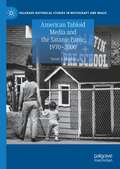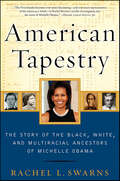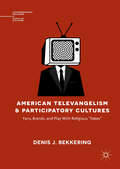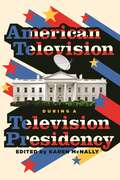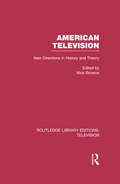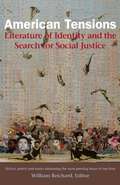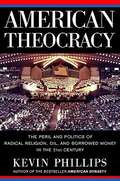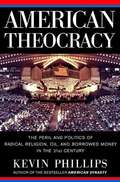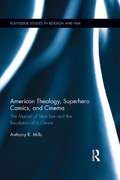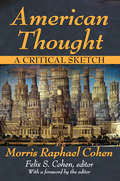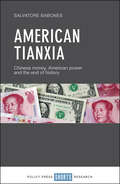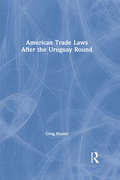- Table View
- List View
American Tabloid Media and the Satanic Panic, 1970-2000 (Palgrave Historical Studies in Witchcraft and Magic)
by Sarah A. HughesThis book examines the “satanic panic” of the 1980s as an essential part of the growing relationship between tabloid media and American conservative politics in the 1980s. It argues that widespread fears of Satanism in a range of cultural institutions was indispensable to the development and success of both infotainment, or tabloid content on television, and the rise of the New Right, a conservative political movement that was heavily guided by a growing coalition of influential televangelists, or evangelical preachers on television. It takes as its particular focus the hundreds of accusations that devil-worshippers were operating America’s white middle-class suburban daycare centers. Dozens of communities around the country became embroiled in trials against center owners, the most publicized of which was the McMartin Preschool trial in Manhattan Beach, California. It remains the longest and most expensive criminal trial in the nation’s history.
American Taboo: A Murder in the Peace Corps
by Philip Weiss“The story of how [Dennis Priven] got away with murder . . . a fascinating diorama of life in the Peace Corps in the 1970s, on the edge of the world.” —The New York Times Book ReviewIn 1975, a new group of Peace Corps volunteers landed on the island nation of Tonga. Among them was Deborah Gardner—a beautiful twenty-three-year-old who, in the following year, would be stabbed twenty-two times and left for dead inside her hut.Another volunteer turned himself in to the Tongan police, and many of the other Americans were sure he had committed the crime. But with the aid of the State Department, he returned home a free man. Although the story was kept quiet in the United States, Deb Gardner’s death and the outlandish aftermath took on legendary proportions in Tonga.Now journalist Philip Weiss “shines daylight on the facts of this ugly case with the fervor of an avenging angel” (Chicago Tribune), exposing a gripping tale of love, violence, and clashing ideals. With bravura reporting and vivid, novelistic prose, Weiss transforms a Polynesian legend into a singular artifact of American history and a profoundly moving human story.“This meticulously deconstructed tale of a Peace Corps volunteer murdering another in Tonga and basically getting away with it has to be one of the most exotic true-crime books of recent years, and one of the saddest.” —The Washington Post“[A] compelling and disturbing exposé . . . even novice true crime readers will find this a gripping and deeply sad story that will do little to bolster faith in the U.S. government’s ethical priorities.” —Publishers Weekly (starred review)
American Tacos: A History and Guide
by José R. RalatThis culinary travelogue is “a deeply researched guide to north-of-the-border taco culture and history” (Los Angeles Times).Tacos may have been created south of the border, but Americans have made this Mexican food their own, with each style reflective of a time and a place. American Tacos explores them all, taking us on a detailed and delicious journey through the evolution of this dish.In search of every taco variety from California to Texas and beyond, José Ralat traveled from coast to coast and border to border, visiting thirty-eight cities across the country. He examines the pervasive crunchy taco and the new Alta California tacos from chefs Wes Avila, Christine Rivera, and Carlos Salgado. He tastes famous Tex-Mex tacos like the puffy taco and breakfast taco, then tracks down the fry bread taco and the kosher taco. And he searches for the regional hybrid tacos of the American South and the modern, chef-driven tacos of restaurants everywhere. Throughout, he tells the story of how each style of taco came to be, creating a rich look at the diverse taco landscape north of the border. Featuring interviews with taqueros and details on taco paraphernalia and the trappings of taco culture, American Tacos is a book no taco fan will want to take a bite without.“[American Tacos] offers plenty of recommendations on where to get great tacos…But it offers much more than that.” ?Chicago Tribune“A fast-paced cultural survey and travel guide . . . An exceptional book.” ?TASTE“Fabulous.” ?San Francisco Chronicle
American Tacos: A History and Guide
by José R. RalatThis culinary travelogue is “a deeply researched guide to north-of-the-border taco culture and history” (Los Angeles Times).Tacos may have been created south of the border, but Americans have made this Mexican food their own, with each style reflective of a time and a place. American Tacos explores them all, taking us on a detailed and delicious journey through the evolution of this dish.In search of every taco variety from California to Texas and beyond, José Ralat traveled from coast to coast and border to border, visiting thirty-eight cities across the country. He examines the pervasive crunchy taco and the new Alta California tacos from chefs Wes Avila, Christine Rivera, and Carlos Salgado. He tastes famous Tex-Mex tacos like the puffy taco and breakfast taco, then tracks down the fry bread taco and the kosher taco. And he searches for the regional hybrid tacos of the American South and the modern, chef-driven tacos of restaurants everywhere. Throughout, he tells the story of how each style of taco came to be, creating a rich look at the diverse taco landscape north of the border. Featuring interviews with taqueros and details on taco paraphernalia and the trappings of taco culture, American Tacos is a book no taco fan will want to take a bite without.“[American Tacos] offers plenty of recommendations on where to get great tacos…But it offers much more than that.” ?Chicago Tribune“A fast-paced cultural survey and travel guide . . . An exceptional book.” ?TASTE“Fabulous.” ?San Francisco Chronicle
American Tall Tales
by Adrien StoutenburgHere are the most robust characters in American legend. Told by a poet with a poet's ear for the impact of words, these American mavericks walk and talk across the pages in a free, wide way, as they walked and talked across the free, wide America of pioneer days.
American Tall Tales
by Mary Pope Osborne Michael MccurdyCelebrating the 15th anniversary of these collection of tales. There are among nine "tall" heroes featured in this exuberant collection of traditional American folk tales, including Paul Bunyan, Johnny Apple seed, John Henry, and other American folk heroes.
American Tanks and AFVs of World War II
by Mike GreenStuart, Sherman, Lee, and Grant tanks dominated the US Army and Marine Corps armored warfare effort versus Nazi Germany and Tojo's Japan. This book details the full range of these vehicles, giving technical specifications and development features as well as describing how they were manned and fought in battle.The equipping of the United States military with the weapons it needed to prevail during World War II was an unparalleled example of America's industrial might at the time. Among the many weapons produced by America's workers, tanks rate as an important example with 88,140 built between 1939 and 1945. This was almost twice what Germany and Great Britain built combined during the same period. These tanks not only equipped America's ground forces but saw service with many allied armies. In addition to the 18,620 tank-based variants, such as armored engineering vehicles, self-propelled artillery, armored recovery vehicles, and tank destroyers, American factories went on to design and build thousands of wheeled armored cars for reconnaissance purposes and armored half-tracks to transport the infantry into battle behind the tanks. Like the tanks, American armored half-tracks were modified to serve a wide variety of jobs including self-propelled artillery, tank destroyers and antiaircraft vehicles. So useful were these vehicles that they would remain in service with foreign armies for decades after World War II. To complement its inventory of tanks and armored fighting vehicles the American military industrial complex also designed and built over 18,000 amphibian tractors. Appearing in both unarmored and armored variants they went into combat with a wide variety of armaments. Referred to as the Landing Vehicle Tracked (LVT) they would serve not only with the U.S. Marine Corps who often called them "Amtracs" but the US Army who referred to them as the "Water Buffalo." They would allow the American military to take the fight to the far flung Japanese Empire wherever it had established itself in the vast reaches of the Pacific Area of Operations. These same vehicles would also see service in the ETO with the US Army and allied forces when it came time to cross various water obstacles used by the German military as defensive barriers.
American Tapestry: The Story of the Black, White, and Multiracial Ancestors of Michelle Obama
by Rachel L. Swarns“Riveting . . . American Tapestry is not only the remarkable story of the First Lady’s family, but also a microcosm of this country’s story as well.” —USA TodayIn this extraordinary feat of genealogical research—in the tradition of The Hemmingses of Monticello and Slaves in the Family—author Swarns, a respected Washington-based reporter for the New York Times, tells the fascinating and hitherto untold story of Ms. Obama’s black, white, and multiracial ancestors; a history that the First Lady herself did not know.At once epic, provocative, and inspiring, American Tapestry is more than a true family saga; it is an illuminating mirror in which we may all see ourselves.“The First Family becomes ever more fascinating—and ever more representative of the nation as a whole—in Rachel Swarns’s terrific investigation into the roots of Michelle Obama . . . This is a most compelling read and more evidence for our interconnectedness as a people.” —Henry Louis Gates, Jr.“Rachel Swarns has not only excavated, with painstaking care, the family tree that is Michelle Obama’s, but, with great insight and beautiful prose, has revealed the complex, eye-opening, and disconcerting experiences that are America. This is a work of impressive historical imagination and deep cultural significance.” —Steven Hahn, Pulitzer Prize-winning author“Richly detailed . . . A lushly layered portrait of the nation itself.” —The Boston Globe“A fascinating account of the First Lady’s family . . . Few important women come from such raw places. The book makes you remember why the Obamas . . . seemed so new, so implausible . . . Extraordinary.” —The New York Times
American Tax Resisters
by Romain D. Huret"The American taxpayer"--angered by government waste and satisfied only with spending cuts--has preoccupied elected officials and political commentators since the Reagan Revolution. But resistance to progressive taxation has older, deeper roots. American Tax Resisters presents the full history of the American anti-tax movement that has defended the pursuit of limited taxes on wealth and battled efforts to secure social justice through income redistribution for the past 150 years. From the Tea Party to the Koch brothers, the major players in today's anti-tax crusade emerge in Romain Huret's account as the heirs of a formidable--and far from ephemeral--political movement. Diverse coalitions of Americans have rallied around the flag of tax opposition since the Civil War, their grievances fueled by a determination to defend private life against government intrusion and a steadfast belief in the economic benefits and just rewards of untaxed income. Local tax resisters were actively mobilized by business and corporate interests throughout the early twentieth century, undeterred by such setbacks as the Sixteenth Amendment establishing a federal income tax. Zealously petitioning Congress and chipping at the edges of progressive tax policies, they bequeathed hard-won experience to younger generations of conservatives in their pursuit of laissez-faire capitalism. Capturing the decisive moments in U. S. history when tax resisters convinced a majority of Americans to join their crusade, Romain Huret explains how a once marginal ideology became mainstream, elevating economic success and individual entrepreneurialism over social sacrifice and solidarity.
American Televangelism and Participatory Cultures: Fans, Brands, And Play With Religious Fakes (Contemporary Religion And Popular Culture Ser.)
by Denis J. BekkeringThis book examines unintended participatory cultures and media surrounding the American televangelists Robert Tilton and Tammy Faye Bakker-Messner. It brings to light heavily ironic fan followings; print, audio, and video projects; public access television parodies; and other comedic participatory practices associated with these controversial preachers from the 1980s onwards. For Tilton’s ministry, some of these activities and artifacts would prove irksome and even threatening, particularly an analog video remix turned online viral sensation. In contrast, Bakker-Messner’s “campy” fans – gay men attracted to her “ludicrous tragedy” – would provide her unexpected opportunities for career rehabilitation. Denis J. Bekkering challenges “supply-side” religious economy and branding approaches, suggestions of novelty in religion and “new” media studies, and the emphasis on sincere devotion in research on religion and fandom. He also highlights how everyday individuals have long participated in public negotiations of Christian authenticity through tongue-in-cheek play with purported religious “fakes.”
American Television News: The Media Marketplace and the Public Interest
by Steve M. BarkinThis concise history of the news broadcasting industry will appeal to both students and general readers. Stretching from the "radio days" of the 1920s and 1930s and the early era of television after World War II through to the present, the book shows how commercial interests, regulatory matters, and financial considerations have long shaped the broadcasting business. The network dominance of the 1950s ushered in the new prominence of the "anchorman," a distinctly American development, and gave birth to the "golden age" of TV broadcasting, which featured hard-hitting news and documentaries epitomized by the reports by CBS's Edward R. Murrow. Financial pressures and advertising concerns in the 1960s led the networks to veer away from their commitment to serve the public interest, and "tabloid" television - celebrity, gossip-driven "soft news" - and news "magazines" became increasingly widespread. In the 1980s cable news further transformed broadcasting, igniting intense competition for viewers in the media marketplace. Focusing on both national and local news, this stimulating volume examines the evolution of broadcast journalism. It also considers how new electronic technologies will affect news delivery in the 21st century, and whether television news can still both serve the public interest and maintain an audience.
American Television during a Television Presidency (Contemporary Approaches to Film and Media Series)
by Steven Cohan Donna Peberdy Oliver Gruner Hannah Andrews Simon Stow Kathryn Castle Michael Mario Albrecht Aimee Mollaghan Martin Murray Karen McNally Teresa Forde Gregory Frame K. Scott Culpepper Kwakiutl L. Dreher Jessica Ford Rafal Kus Dolores Resano Martin Zeller-JacquesIn American Television during a Television Presidency, Karen McNally and contributors critically examine the various ways in which television became transfixed by the Trump presidency and the broader political, social, and cultural climate. This book is the first to fully address the relationship between TV and a presidency consistently conducted with television in mind. The sixteen chapters cover everything from the political theater of televised impeachment hearings to the potent narratives of fictional drama and the stinging critiques of comedy, as they consider the wide-ranging ways in which television engages with the shifting political culture that emerged during this period. Approaching television both historically and in the contemporary moment, the contributors¾an international group of scholars from a variety of academic disciplines¾illuminate the indelible links that exist between television, American politics, and the nation’s broader culture. As it interrogates a presidency played out through the lens of the TV camera and reviews a medium immersing itself in a compelling and inescapable subject, American Television during a Television Presidency sets out to explore what defines the television of the Trump era as a distinctive time in TV history. From inequalities to resistance, and from fandom to historical memory, this book opens up new territory in which to critically analyze television’s complex relationship with Donald Trump, his presidency, and the political culture of this unsettled and simultaneously groundbreaking era. Undergraduate and graduate students and scholars of film and television studies, comedy studies, and cultural studies will value this strong collection.
American Television: New Directions in History and Theory (Routledge Library Editions: Television)
by Nick BrowneThis work brings together writings on television published in Quarterly Review of Film and Video, from essays by Nick Browne and Beverle Houston to the latest historical and critical research. It considers television's economics, technologies, forms and audiences from a cultural perspective that links history, theory and criticism. The authors address several key issues: the formative period in American television history; the relation between television's political economy and its cultural forms; gender and melodrama; and new technologies such as video games and camcorders. Originally published in 1993.
American Tempest: How the Boston Tea Party Sparked a Revolution
by Harlow Giles UngerOn Thursday, December 16, 1773, an estimated seven dozen men, many dressed as Indians, dumped roughly £10,000 worth of tea in Boston Harbor. Whatever their motives at the time, they unleashed a social, political, and economic firestorm that would culminate in the Declaration of Independence two-and-a-half years later. The Boston Tea Party provoked a reign of terror in Boston and other American cities as tea parties erupted up and down the colonies. The turmoil stripped tens of thousands of their homes and property, and nearly 100,000 left forever in what was history's largest exodus of Americans from America. Nonetheless, John Adams called the Boston Tea Party nothing short of "magnificent," saying that "it must have important consequences. " Combining stellar scholarship with action-packed history, Harlow Giles Unger reveals the truth behind the legendary event and examines its lasting consequence--the spawning of a new, independent nation.
American Tensions: Literature of Identity and the Search for Social Justice
by William ReichardThis anthology of contemporary American poetry, short fiction, and nonfiction, explores issues of identity, oppression, injustice, and social change. Living American writers produced each piece between 1980 and the present; works were selected based on literary merit and the manner in which they address one or more pressing social issues. William Reichard has assembled some of the most respected literary artists of our time, asking whose voices are ascendant, whose silenced, and why. The work as a whole reveals shifting perspectives and the changing role of writing in the social justice arena over the last few decades.
American Theocracy
by Kevin PhillipsAn explosive examination of the coalition of forces that threatens the nation, from the bestselling author of American Dynasty In his two most recent bestselling books, American Dynasty and Wealth and Democracy, Kevin Phillips established himself as a powerful critic of the political and economic forces that rule--and imperil--the United States, tracing the ever more alarming path of the emerging Republican majority's rise to power. Now Phillips takes an uncompromising view of the current age of global overreach, fundamentalist religion, diminishing resources, and ballooning debt under the GOP majority. With an eye to the past and a searing vision of the future, Phillips confirms what too many Americans are still unwilling to admit about the depth of our misgovernment.
American Theocracy: The Peril and Politics of Radical Religion, Oil and Borrowed Money in the 21st Century
by Kevin PhillipsFrom America's premier political analyst, an explosvie examination of the coalition of forces that threatens the nation in this century.
American Theology, Superhero Comics, and Cinema: The Marvel of Stan Lee and the Revolution of a Genre (Routledge Studies in Religion and Film)
by Anthony MillsStan Lee, who was the head writer of Marvel Comics in the early 1960s, co-created such popular heroes as Spider-Man, Hulk, the X-Men, the Fantastic Four, Iron Man, Thor, and Daredevil. This book traces the ways in which American theologians and comic books of the era were not only both saying things about what it means to be human, but, starting with Lee they were largely saying the same things. Author Anthony R. Mills argues that the shift away from individualistic ideas of human personhood and toward relational conceptions occurring within both American theology and American superhero comics and films does not occur simply on the ontological level, but is also inherent to epistemology and ethics, reflecting the comprehensive nature of human life in terms of being, knowing, and acting. This book explores the idea of the "American monomyth" that pervades American hero stories and examines its philosophical and theological origins and specific manifestations in early American superhero comics. Surveying the anthropologies of six American theologians who argue against many of the monomyth’s assumptions, principally the staunch individualism taken to be the model of humanity, and who offer relationality as a more realistic and ethical alternative, this book offers a detailed argument for the intimate historical relationship between the now disparate fields of comic book/superhero film creation, on the one hand, and Christian theology, on the other, in the United States. An understanding of the early connections between theology and American conceptions of heroism helps to further make sense of their contemporary parallels, wherein superhero stories and theology are not strictly separate phenomena but have shared origins and concerns.
American Therapy
by Jonathan EngelFrom Freud to Zoloft, the first comprehensive history of American Psychotherapy Fifty percent of Americans will undergo some form of psychotherapy in their lifetimes, but the origins of the field are rarely known to patients. Yet the story of psychotherapy in America brims with colorful characters, intriguing experimental treatments, and intense debates within this community of healers. American Therapy begins, as psychotherapy itself does, with the monumental figure of Sigmund Freud. The book outlines the basics of Freudian theory and discusses the peculiarly powerful influence of Freud on the world of American mental health. The book moves through the emergence of group therapy, the rise of psychosurgery, the evolution of uniquely American therapies such as Gestalt, rebirthing, and primal scream therapy, and concludes with the modern world of psychopharmacology, cognitive-behavioral therapy, and highly targeted short-term therapies. For a counseled nation that freely uses terms such as "emotional baggage" and no longer stigmatizes mental health care, American Therapy is a remarkable history of an extraordinary enterprise.
American Thighs
by Jill Conner Browne"If I can save one woman from these thighs, I will not have lived in vain," #1New York Timesbestselling humorist Jill Conner Browne writes inAmerican Thighs, her handbook and memoir for the Hot and Flashy. Whether young enough to look "hot" or of the age to onlyfeelthat way (in flashes with buckets of sweat), every woman has given, or will give, ample thought to preserving her best "assets" (thighs included), so that the dread transition from "cute girl" to "ma'am" won't be quite so unsettling. Here are stories of growing up and learning about life -- usually the hard way! From disastrous haircuts and color jobs to fashion or verbal faux pas committed, from the kiss wished for but never gotten to the one that should have been skipped, these are the moments that mark each of our journeys from what we thought back then to what we now know. Since to say that Youth is wasted on the Young has got to betheunderstatement of all time, it falls upon Browne, as one older and wiser, to take a "Hit and Run" down Memory Lane for the sake of offering "Asset-Preserving Tips," with astonishing disclosures about: Why women have risked their lives just to get a little bit blonder How the muumuu has been fashionably resurrected as the "patio dress" Why it's important to always have a good photo of yourself on hand -- just in case How, no matter what skin you're in, to make it last a lifetime Why you can never trust anyone over eighty-five
American Thought: A Critical Sketch
by Morris CohenWhat constitutes American thought is obviously too elusive to be encompassed by any one writer or group of writers. The best that any attempt at intellectual history can achieve is to indicate some of its traces in written records. This volume represents the eff orts of one of America's leading philosophers to do just that. He is uniquely qualified to do so, as his contemporary Sidney Hook well understood.As Cohen noted, most of what people say and write is dominated by linguistic forms or habits. Thus the dominance of the traditions and habits that make up the English language has been the strongest single infl uence in fashioning American thought as very largely a province of British thought - despite the Declaration of Independence and two wars. Cohen describes how American thought developed from its British roots. It deals with reflective thought, i.e. with thought that is conscious of its problems, of its methods and of the widest general bearings of the results obtained so far. The diverse subjects discussed range from religious thinking to the scientific, and from the legal tradition to literary criticism.Among the important figures Cohen assesses are Dewey, Santayana, Holmes, Brandeis, Whitehead, James, and Royce as well as those of men less well-known but sometimes equally influential. In its scope and insight, this book takes its own unique and important place in American thought.
American Tianxia: Chinese Money, American Power and the End of History
by Salvatore BabonesAfter a meteoric rise, China's once inexorable growth has come to a screeching halt. With it ends China's dream of establishing a new tianxia (‘harmonious order’) in Asia with China at its centre. Salvatore Babones provides an up-to-date assessment of China's economic problems and how they are undermining China's challenge to the Western-dominated world order. As China's neighbours and many of its own most talented people look to the United States to ensure their security and prosperity, global power is slowly but surely consolidating in a twenty-first century American Tianxia. A closely argued antidote to defeatist accounts of Western decline, this book tells the story of how liberal individualism has become the leitmotif of the American Tianxia, an emerging world-system in which people of all nationalities seek a share in the economic, cultural, and political system that is America writ large.
American Time Bomb: Attica, Sam Melville, and a Son's Search for Answers
by Joshua Melville"American Time Bomb is a vital read for this moment. " —Heather Ann Thompson, author of the Pulitzer Prize–winning Blood in the Water: The Attica Prison Uprising of 1971 and Its Legacy Few stories are more central to understanding our history of racially biased incarceration and violent social activism than the life of Sam Melville. Melville was both reviled and admired as one of the most feared radicals in post–World War II history. His importance in the 1960s is widely recognized by historians and scholars as epitomizing the controversies, the promise, and the problems of the New Left. This memoir by Melville's son opens a window into the personal life of a legend, revealing the universal and all-too-human foibles motivating those driven to make change through violence. In the current political climate, at the fiftieth anniversary of the Attica Uprising, this nation grows increasingly interested in the racially biased incarceration and violent social activism that has shaped our nation. There are few stories more central to both subjects than the life of Sam Melville, who was often called "the Mad Bomber." American Time Bomb is a son's personal portrait based on years of investigation of Melville's story and the history he helped to create.Joshua Melville's personal connection to the story gives a gut-wrenching multigenerational tale of childhood abandonment but also adds a compelling historical study of politics, history, and issues of social justice.
American Titan: Searching for John Wayne
by Marc EliotAs he did in his bestselling biographies of Cary Grant, Jimmy Stewart, and Clint Eastwood, Marc Eliot offers an exciting, groundbreaking new take on an American icon—the most legendary Western film hero of all time, John WayneAn audience favorite and top box-office draw for decades, John Wayne symbolized masculinity, power, and patriotism, and inspired millions of Americans. Yet despite his popularity and success, he was unfairly dismissed as a "B" movie actor lacking elegance, creativity, range, and depth. American Titan challenges conventional wisdom and reevaluates Wayne's life and vital cinematic legacy, ultimately placing the man known as "Duke" among a select and brilliant pantheon of "actor auteurs"—artists whose consistency of style in their work reflects their personal creative vision.In American Titan, Eliot demonstrates that Wayne possessed a distinct and remarkable vision rooted in his unique Midwestern and West Coast childhood that would become manifest in one of the most enduring screen personalities of all time: the elusive, stoic frontier loner. Wayne's heroic outsider also influenced a new generation of actors and filmmakers who would borrow from it to use in their own movies.Drawing on his deep, extensive knowledge of Hollywood and film, Eliot contends that the primary driving force behind Wayne's extraordinary career and body of work was the result of his own ambitions and his collaborations with directors John Ford and Howard Hawks. Eliot offers as evidence the distinct personality that runs through Wayne's staggering 169 films, from Stage Coach and The Searchers to The Quiet Man and The Green Berets.Setting Wayne's life within the sweeping political and social transformations that defined the nation, Eliot's masterly revisionist portrait is a remarkable in-depth look at a life that embodied the spirit of the twentieth century. What emerges is nothing less than a powerful understanding of and appreciation for a true American titan.Marc Eliot is the New York Times bestselling author of more than a dozen books on popular culture, among them the highly acclaimed Cary Grant, the award-winning Walt Disney: Hollywood's Dark Prince, and American Rebel: The Life of Clint Eastwood. He writes for a number of publications and frequently speaks about film at universities and to film groups, and on radio and television. He lives in New York City and Woodstock, New York.MarcEliot.net
American Trade Laws After the Uruguay Round
by Greg MastelThis text seeks to anaylze the three pillars of US trade law: Section 301, aimed at opening foreign markets for US exports; anti-dumping law, which seeks to counter anti-competitive tactics by foreign firms; and counterveiling duty law that aims to counter foreign governmental law.
